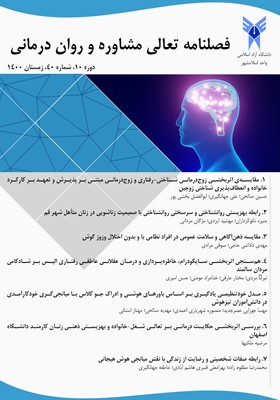رابطه صفات شخصیتی و رضایت از زندگی با نقش میانجی هوش هیجانی
محورهای موضوعی : فصلنامه تعالی مشاوره و روان درمانی
محمدرضا مظلوم زاده
1
![]() ,
بهرامعلی قنبری هاشم آبادی
2
*
,
عاطفه جهانگیری
3
,
بهرامعلی قنبری هاشم آبادی
2
*
,
عاطفه جهانگیری
3
![]()
1 - دانشجوی کارشناسی ارشد، گروه روانشناسی بالینی، دانشگاه فردوسی مشهد، مشهد، ایران
2 - استاد، گروه روانشناسی، دانشگاه فردوسی مشهد، مشهد، ایران
3 - دانشجوی کارشناسی، گروه روانشناسی، دانشگاه فردوسی مشهد، مشهد، ایران
کلید واژه: هوش هیجانی, رضایت از زندگی, صفات شخصیتی,
چکیده مقاله :
هدف: هدف مطالعه حاضر بررسی رابطه بین صفات شخصیتی و رضایت از زندگی با نقش میانجیگری هوش هیجانی بود. روش: طرح پژوهش حاضر توصیفی از نوع همبستگی بود. جامعه آماری این پژوهش، شامل بزرگسالان ایرانی ساکن شهر مشهد در سال 2021 در دامنه سنی 18 تا 60 سال بودند که از این میان 407 نفر با روش نمونهگیری در دسترس انتخاب شدند. دادهها با استفاده از فرم کوتاه پرسشنامه شخصیت نئو (Costa & McCrae, 1992)، پرسشنامه رگه هوش هیجانی - فرم کوتاه (Petrides & Furnham, 2006) و پرسشنامه رضایت از زندگی (Diener et al., 1985) جمعآوری شدند. دادهها با استفاده از روشهای همبستگی پیرسون و تحلیل مسیر از طریق نرمافزارهای SPSS نسخه 26 و AMOS نسخه 24 مورد تجزیه و تحلیل قرار گرفتند. یافتهها: نتایج تحلیل مسیر نشان داد که مدل پژوهش از برازش خوبی برخوردار بود. روانرنجوری، برونگرایی، گشودگی به تجربه و وجدانگرایی بر رضایت از زندگی و هوش هیجانی اثر مستقیم معنادار داشتند. همچنین، مولفههای هوش هیجانی شامل درک و ارزیابی عواطف خود و دیگران، خوشبینی، خودآگاهی و مهارتهای اجتماعی بر رضایت از زندگی اثر مستقیم معنادار داشتند. علاوه براین، نقش میانجی خوشبینی در رابطه بین روانرنجوری، برونگرایی و وجدانگرایی با رضایت از زندگی (05/0p<)، نقش میانجی خودآگاهی، درک و ارزیابی عواطف خود و دیگران در رابطه بین روانرنجوری، برونگرایی، گشودگی به تجربه و وجدانگرایی با رضایت از زندگی (001/0p<) و نقش میانجی مهارتهای اجتماعی در رابطه بین روانرنجوری، برونگرایی و وجدانگرایی با رضایت از زندگی (001/0p<) تایید شدند. نتیجهگیری: بر اساس نتایج پژوهش حاضر میتوان گفت که صفات شخصیتی از طریق هوش هیجانی بر رضایت از زندگی اثر میگذارد؛ درنتیجه یکی از راههای افزایش رضایت از زندگی بالا بردن هوش هیجانی افراد با توجه به صفات شخصیتی آنهاست.
Purpose: The aim of the current study was to investigate the relationship between personality characteristics and life satisfaction regarding the mediating role of emotional intelligence. Methodology: The method of this study was descriptive-correlational. The statistical population of this study Included Iranian adults living in Mashhad in 2021 with an age range of 18 to 60, from which 407 people were selected by available sampling method. Data were collected using short form of NEO Personality Questionnaire (Costa & McCrae, 1992), Trait Emotional Intelligence Questionnaire-Short Form (Petrides & Furnham, 2006) and Satisfaction with Life Scale (Diener, Emmons, Larsen, & Griffin, 1985). Data were analyzed by Pearson correlation method and path analysis using SPSS version 26 and AMOS version 24 software. Findings: The path analysis results showed that the research model had a good fit. Neuroticism, extraversion, openness to experience and conscientiousness had a significant direct effect on life satisfaction and emotional intelligence. Components of emotional intelligence including perception and understanding self and others' emotions, optimism, self-awareness and social skills had a significant direct effect on life satisfaction. In addition, the mediating role of optimism in the relationship between neuroticism, extraversion and conscientiousness and life satisfaction (p <0.05), the mediating role of self-awareness and perception and understanding self and others' emotions in the relationship between neuroticism, extraversion, openness to experience and conscientiousness and life satisfaction (p <0.001) and the mediating role of social skills in the relationship between neuroticism, extraversion and conscientiousness and life satisfaction (p <0.001) was confirmed. Conclusion: Based on the results of the current study, it can be concluded that personality characteristics affect life satisfaction through the mediating role of emotional intelligence; therefore, increasing people's emotional intelligence according to their personality characteristics is one of the ways to enhance life satisfaction.
_||_

